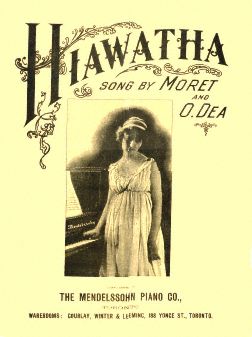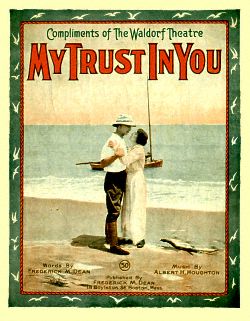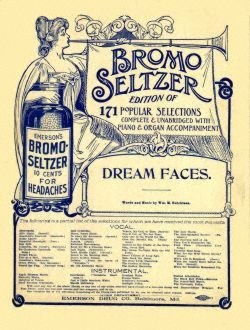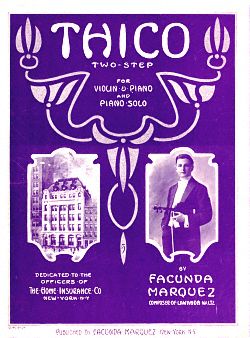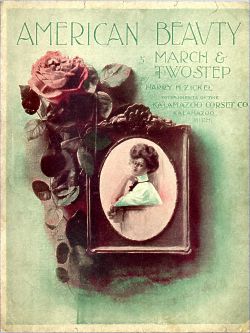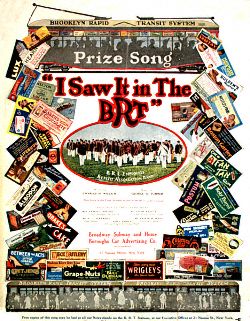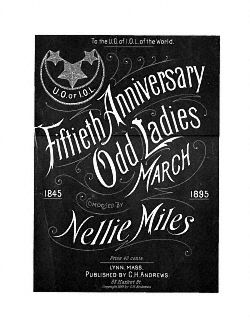|
August, 2000 Edition "Vanity Music", Music as Advertising One thing America and the capitalist society has not been short of is advertising and marketing. From earliest times, American business has used every possible opportunity to advertise and drub us with "buy, buy, buy" messages. Of course, for advertising to work, it has to reach a wide audience. Today, we have mass media that makes it easy for advertisers to reach a wide audience. In the past though, such media were not available so the advertisers had to use other methods. The music publishing industry provided one of the best mediums of the times during the late 19th century and early 20th century. Americans had a voracious appetite for music and with some songs selling in the millions, music became a powerful option to spread the word. We see this most evident on the backs of music (we will explore this next month as a continuation of this subject). Beyond that, the music itself often became the commercial message. Sometimes overtly, sometimes more subtly. This month we will share some of the songs that were written exclusively as plugs for organizations or companies and how they fit into the scheme of marketing and advertising during the period. Our essay, Advertising in Music, provides more in depth information about this interesting aspect of American popular music. This month we are also very excited to introduce our new format for the presentation of our music, SCORCH. Scorch is a plug in for your browser that will allow you to not only listen to our songs but to view the playing, real time on sheet music WITH LYRICS! Though we often find plug-ins to be annoying, this is one that we guarantee will be well worth the time to download and install. Once done, you will not have to mess with it again and will be able to enjoy our music at a level that far exceeds your past experiences. This innovation is just another reason that we feel we offer the very best and most incisive nostalgic music experience on the net. For the next couple of months we will continue to provide
midi versions so everyone can transition but soon, all music will be
in the Sibelius format. So, to get started, download the Scorch player
from Sibelius right now, then enjoy an astounding musical experience!
The player is available for Mac and PC so all of you can enjoy the experience,
MORE SONGS! Oh, and don't forget to read this month's installment of "In Search of American Popular Music", Advertising In Music. The subject is obviously advertising and music and as usual, there are more songs for your enjoyment. |
|
(Note, all cover image links now require the "SCORCH" player) This first song is an example of a common practice during the period; take an existing popular song, buy the rights and publish it as a "giveaway" with prominent credits to the company "sponsoring" the song. In this case, we have the Mendelssohn Piano Company. I have been hard pressed to find any information about this Canadian piano manufacturer. Postings on bulletin boards and e-mail's to various piano groups have gone unanswered. A search of the net reveals nothing except one cryptic entry giving an 1895 date. With showrooms in Toronto at 188 Yonge Street, surely this company was an important piano manufacturer yet they seem to have disappeared without a trace, at least in the cyber world. See another great example from the Sterling Piano company in this month's article about Advertising In Music. The song, "Hiawatha" was published in 1903 and obviously issued by Mendelssohn sometime thereafter. The giveaway copy has no publication or copyright date nor does it list the original copyright holder, Charles N. Daniels. The song was originally written around 1900 by Moret as an instrumental work as a tribute to a town in Kansas (Hiawatha, Kansas) where his sweetheart lived. John Philip Sousa's band introduced the work in 1901. In 1903, O'Dea wrote lyrics to the work and at that point it became a hit song.
Listen
to this 1903 "Indian" song (SCORCH format)
|
|
Here we have yet another song borrowed as a marketing giveaway. This time, the promotion is for a motion picture theater. I believe this song is a "theme song" from a movie that was playing at the time. The cover art has a photo-realistic quality that lends itself to looking like a scene from a movie. Wait, you say. Movies had no music in 1919. True, soundtracks were not to come for a few more years. However, music was written to accompany silent films. As we all have seen, silent films were accompanied by either organ or piano music. In order to ensure the "right" moods, many films came with a suggested score for use in the theater. From these scores, hit songs often emerged. Though I have not been able to find a movie of the exact title, I still suspect that this song came out of a movie. That makes the Waldorf Theater's use of it a sensible promotion. There was a film titles "A Maiden's Trust" with Alice Fay and Ford Sterling, perhaps it is from that? Maybe one of our alert visitors can solve the mystery for us? Regardless of origins, the song is a wonderfully touching ballad. Hear
this old delight (scorch format)
|
|
From subtle we move to overt. There is absolutely no doubt that this is advertising; in your face, all over you advertising. The Emerson Drug Company, maker of Bromo Seltzer was formed by Capt. Isaac Emerson, the inventor of Bromo-Seltzer and was quite successful. A factory was built in Baltimore and the company headquarters in Baltimore, The Emerson Bromo-Seltzer Tower at 312-318 West Lombard St. and South Paca St. is a National Registry of historical places Landmark site. Old Bromo Seltzer bottles are a sought after collectible and I can remember the item as an ubiquitous nostrum on the shelves of drug stores in my hometown. Emerson Drug created an edition of 171 popular songs and used them as a marketing promotional item. Of course, the cover art ensured that a reminder of Bromo Seltzer was always prominent in many a home. In this case, compared to many of our other examples this month, the music seems to take a back seat to the advertising message. Many of the songs in the collection were old standards such as Ben Bolt, Hail Columbia, Home Sweet Home and Listen To The Mocking Bird. Other songs were more contemporary favorites such as the present song. The collection also included instrumental works. Not only could you pick these up at the "music department" of your drug store but the Emerson Drug store would send you free copies. At the bottom of the front page is found this statement; "Will send any two of the above pieces or any two of our entire selection upon receipt of a two-cent stamp and Bromo Seltzer wrapper." I think this edition marks one of the first "redeem for a prize" marketing campaigns. Quite cagey and quite successful. The song is a remarkably fine example of ballads of the times. Listen to this great old song (scorch format only)
|
|
Thico Two Step Now we see an example of "vanity" music; a song written specifically for a company and named after them. The Home Insurance Company was domiciled in New York as evidenced by the photo of their office and the caption on the cover. Like many things associated with our music from the past, The Home Insurance Company seems to have faded into the sunset. I have searched but can find no reference to them. Perhaps they were absorbed by another company, perhaps they changed their name, perhaps the depression did them in. If anyone knows, let us know. In the meanwhile, we have a piece composed and dedicated to "The Officers of The Home Insurance Company" (I'll bet there is a story there too, can you imaging writing a song to your boss?). The work is a delightful period piece for violin & piano and I have voiced it for same. It is a raggy piece, really upbeat and fun. The composer, Facunda Marquez has also faded into obscurity. From an advertising point of view, many companies commissioned songs for their own aggrandizement during this period. Just as with the Bromo Seltzer series, having these works in circulation not only placed the company's name in front of the consumer but also caused a positive association through a fine piece of music. Hear this work for violin & piano (scorch)
|
|
Here we have another vanity song with a quite beautiful, noncommercial cover. The American Beauty March & Two Step was published in 1908 by the Kalamazoo Corset Company. The song enjoyed a long popularity and was reissued a number of times. The Kalamazoo Corset Co., like THICO has long since disappeared but thanks to Paula Metzler, Collections Manager at the Kalamazoo Valley Museum in Kalamazoo, Michigan, we can know the history of this company. The company made its mark by introducing the "featherbone corset". Prior to 1883, corsets were ribbed with whalebone. The bone (actually baleen) grew brittle and broke with age. Worse yet, on warm days, baleen actually exuded an unpleasant fishy odor, ewwww! In 1883, Edward K. Warren patented a corset ribbed with cut up splints of turkey feathers bound in thread. He named his brainstorm featherbone and with it, was on his way to success. Started first as the Featherbone Corset Company in Three Oaks, Michigan, his rapidly expanding business moved to Kalamazoo in 1893. By 1895, the company offered 20 different styles and by 1914 grew to become the largest corset factory in the world employing over 800 workers. By then, they had introduced a new line, the "Madame Grace" corsets and were advertising in a number of popular magazines such as Vogue and Ladies' Home Journal. After the war, the country entered an era where corsets were not in fashion. As a result, the company moved into other foundation items that would help women seek the look that was popular at the time. Girdles, brassieres and reducing garments were their new stock in trade. In 1922, they changed their name to the Grace Corset Company to emphasize their new image. Having successfully adapted, Grace continued operations and moved to New Jersey in 1950..and there the trail is lost. Well, all that said, lets march on over to the next tune! Enjoy this great vanity march (scorch)
|
|
Now we are going to get to some serious product mentions. This song mentions no fewer than 47 products not to mention about 20 plugs for the B.R.T. (Brooklyn Rapid Transit). The BRT sponsored a songwriting contest in 1917 and according to the cover, this song was the grand prize winner. Published by the Broadway Subway and Home Borough Car Advertising Company, this song must have made the company managers very happy. Now they not only had the car advertising going for them but had a great song that would make sure that their client's products were being mentioned through song in thousands of homes. What a marketing triumph! The song really is a good one, with a nice tune and advertising notwithstanding, the lyrics are pretty cute too. You will be able to read (and sing if you are so inclined) the first verse through our incredible new SCORCH viewer so be sure to get it, otherwise you will miss a great experience. There are actually five verses to the song. I have only included the first but if anyone is interested in the remaining verses, e-mail me and I'll send them to you.
Hear this great prize winning song. (Scorch)
|
|
Our last featured song (there are more songs in our article about Advertising In Music ) is an example of a vanity work written not for a commercial enterprise but for an organization. The Odd Ladies. Today, this organization is known as the Rebekah Degree. Thanks to Mary Lou Lang, we know something of the organization's origins.
Nellie Miles cut quite a figure for the 1800's and was apparently an accomplished cornetist and bandleader as well as composer. I assume she was a member of the Odd Ladies and wrote this work on their behalf. The reverse of this work has a "programme" from one of Ms. Miles' concerts and of course, advertises her "Amusement Enterprises"
Hear this great old march(scorch) |
We hope you have enjoyed this month's feature and we appreciate your interest in our efforts to bring you the best American popular music history site on the web. Be sure to tell your friends and family about us. If you have suggestions for themes or issues you would like to see in the future, please contact us.
Parlor Songs is an educational website about American popular music and the history of the genre
If you would like to submit an article about America's music for publish on the website, contact the email on the main page. I also welcome suggestions for subjects for future articles.
![]()
All articles are written by the previous owners, unless otherwise stated.
©
1997-2024 by Parlor Songs (former owners Richard A. Reublin or Richard G. Beil). Before using any of these images, text or performances (MIDI or other recordings), please read our usage policy for standard permissions and those requiring special attention. Thanks.
I respect your privacy and do not collect or divulge personal information.
